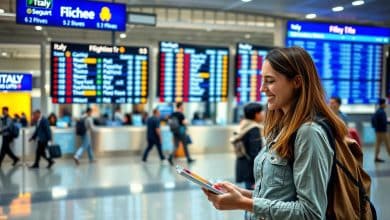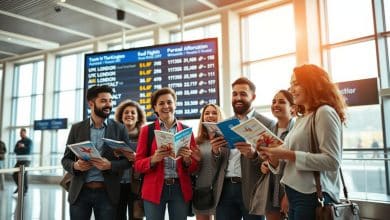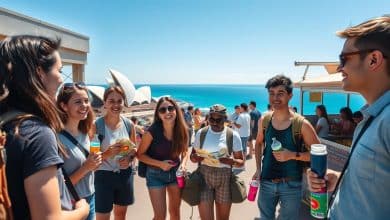Expert Travel Planning: Tips for Immigrants and International Students
Anúncios
Travel planning is key for those moving to the United States. It helps ease worries and makes the move exciting. Knowing local customs, legal rules, and budgeting is important.
A good travel organizer or trip planner can make the transition smooth. They help you adjust to a new culture and lifestyle easily.
Understanding Visa Requirements
Visa requirements are key for anyone planning to travel or study abroad. Knowing the different visas helps in planning your trip. This part explains the various visas, their lengths, limits, and how to apply for them.
Types of Visas for Study and Travel
There are mainly two visa types: student and travel visas. In the U.S., the most common student visas are:
- F-1 Visa: For students in full-time programs.
- J-1 Visa: For those in cultural exchange programs.
Travelers to the U.S. usually get:
- B-1 Visa: For business visitors.
- B-2 Visa: For tourists.
Duration and Limitations of Each Visa
Each visa has its own time limits and rules. For example, F-1 and J-1 visas let you study full-time but have work rules. Travel visas usually last up to six months and don’t allow work. Knowing these rules helps in planning your trip and following U.S. laws.
Application Process and Costs
The visa application process varies by type. The main steps are:
- Gathering needed documents, like proof of study or money.
- Filling out the online visa form (DS-160 for non-immigrant visas).
- Paying the application fee, which varies by visa.
- Scheduling an interview at a U.S. embassy or consulate.
Understanding these steps makes applying easier. It helps you prepare for interviews or extra requirements.
Budgeting for Travel Expenses
Effective budgeting for travel is key for immigrants and international students. It helps them plan their finances well. This way, they can enjoy their travels without overspending.
Estimating Total Travel Costs
To figure out travel costs, consider airfare, accommodation, meals, and transportation. Using cost-calculating tools can help. They give insights into what you might spend.
- Airfare: Look for the best airline prices.
- Accommodation: Choose affordable places that fit your budget.
- Meals: Plan your food budget by trying local dishes and cooking some meals.
- Transportation: Decide between public transport or renting a car and budget for it.
Tips for Saving Money on Travel
There are ways to save money on travel. Here are some tips:
- Travel during off-peak seasons for cheaper prices.
- Use student discounts at attractions and services.
- Book flights and hotels early for the best deals.
- Look for travel packages that include flights and hotels for savings.
Ways to Find Affordable Accommodation
Finding cheap places to stay is important. There are many ways to find affordable options:
- Hostels: They’re cheap and great for meeting people.
- Airbnb: Offers a range of rentals, from shared to entire homes.
- Shared Housing: Living with others can cut costs.
Choosing the Right Destination
When picking a new place for study or travel, the right choice matters a lot. Many things affect your decision, like the weather, local culture, learning opportunities, and the local economy. Knowing these helps make your trip more fun and rewarding.
Factors to Consider When Selecting a Destination
Important things to think about when choosing a place include:
- Climate: Different places have different weather, which affects how you live and what you do.
- Education and University Ranking: Good schools are key, especially for students from other countries.
- Local Economy: Jobs and how much things cost can really influence your choice.
- Community Support: A friendly community makes it easier to adjust to a new place.
Popular U.S. Cities for International Students
Some U.S. cities are especially welcoming for international students. They often choose:
- New York City: Famous for its schools and cultural variety.
- Los Angeles: A blend of fun, learning, and diverse people.
- Chicago: Known for its arts and top universities.
Cultural Aspects of Different Regions
It’s important to know about the culture of different places. Each area has its own customs, food, and traditions. Learning about local ways helps you fit in better. The U.S. is full of amazing cultural diversity.
Planning Your Itinerary
Creating a detailed travel itinerary is key in planning your trip. It makes your journey better and avoids surprises. Without one, you might miss out on great spots or struggle to get around. By managing your itinerary well, you can make the most of your time and have a smoother trip.
Importance of a Detailed Itinerary
A detailed itinerary outlines your daily plans and important events. It helps you keep track of your schedule and focus on the best sights. With a good plan, you can enjoy your trip without worrying about last-minute changes.
Tools and Apps for Itinerary Management
There are many tools and apps to help manage your itinerary. Some popular ones include:
- TripIt: Great for organizing your travel plans in one spot, making it easy to manage bookings and schedules.
- Google Trips: A simple app that collects your reservations from Gmail and organizes them into detailed itineraries.
- Lonely Planet: Provides travel guides and sample itineraries for different places, making planning easier.
Sample Itineraries for First-time Travelers
First-time travelers can use sample itineraries for popular U.S. cities. These plans offer a good structure for your trip, including top attractions and local experiences. Here are a few examples:
- A three-day plan for New York City with visits to the Statue of Liberty and Central Park.
- A weekend trip to San Francisco with stops at the Golden Gate Bridge and Alcatraz Island.
- An exploration of New Orleans, covering the French Quarter and local food tastings.
Booking Transportation
Travel planning is all about knowing your options. When booking, you can choose from air travel and local transit. This guide will help you plan a smooth trip.
Comparing Air Travel Options
There are many flights to choose from. Think about cost, time, and comfort. Direct flights are quick, but might cost more. Connecting flights save money but take longer.
Look at major airlines for international travel. They offer different services and prices.
Understanding Public Transport Systems
Public transport is key in cities. The U.S. has buses, subways, and trains. Knowing how to use them saves money and gets you to attractions.
Learn the schedules, routes, and how to pay. This makes using public transport easier.
Rental Cars vs. Ridesharing Services
Choosing between rental cars and Uber/Lyft is important. Rental cars give you freedom but cost more. They include insurance and fuel.
Ridesharing is easy but can be pricey for long trips. Think about what you need for your trip.
Accommodation Options for Travelers
Choosing where to stay is key when traveling. You can pick from fancy hotels to snug hostels. Each has its own perks for different tastes and wallets. Knowing what’s out there helps make your trip better.
Types of Accommodation Available
There are many places to stay, like:
- Hotels
- Motels
- Hostels
- Homestays
- Vacation rentals
Factors to Consider When Booking
When booking, think about a few things. Look at the location, cost, and what’s included. Being close to sights and transport is handy. Prices vary, so compare to find a deal. Extras like Wi-Fi or breakfast can make your stay better.
Tips for Finding Safe Housing
It’s important to find safe places to stay. Here’s how to do it:
- Read reviews from others who stayed there
- Use trusted websites to book
- Talk to past guests for their opinions
Navigating Local Customs and Culture
For immigrants and international students, knowing local customs is key. It helps them fit in better in the United States. Learning American etiquette and cultural norms makes social and professional interactions smoother.
Understanding American Etiquette
American etiquette covers many social behaviors and expectations. For example, when greeting, a firm handshake and eye contact are important. At meals, wait for the host to start before you eat.
Knowing these small details helps build good relationships in American society.
Important Cultural Norms for Immigrants
In America, respecting diversity is crucial. The country is made up of people from many places. Being on time shows you value others’ time and is very important.
Understanding these norms helps newcomers get along well in social settings.
Resources for Learning Local Customs
There are many ways to learn about local customs. Online guides offer tips on daily social practices. Community workshops provide hands-on learning experiences.
By using these resources, newcomers can better understand and adapt to American culture.
Health and Safety Considerations
Health is key for a safe and fun trip for immigrants and international students. Travel can bring health risks. Knowing about health insurance, vaccinations, and emergency plans is important.
Importance of Travel Insurance
Travel insurance is a must-have for long trips or stays abroad. It protects against unexpected medical bills, trip cancellations, and lost items. Good insurance covers health costs, which is crucial when health issues can pop up anytime.
Having enough insurance lets you enjoy your new place without stress. It gives you peace of mind.
Vaccination and Health Requirements
Know the vaccinations and health rules for your destination before you go. Some places need special shots to keep you safe from local diseases. Doing your homework helps you meet health rules and get the right shots.
This keeps you and others healthy where you’re going.
Emergency Contacts and Resources
It’s vital to have emergency contacts and know local health services. Keep a list of important numbers like hospitals and doctors. This way, you can get help fast if you need it.
Knowing local health services helps you handle health problems confidently while you’re away.
Connecting with Fellow Immigrants and Students
Connecting with others who have moved to a new country can really help. It makes feeling at home easier. Support from the community and making new friends are key.
Support Groups and Communities
Support groups are great for sharing stories and advice. Places like the International Student Organization offer a lot of help. Getting involved in local groups can connect you with people who understand you.
Online Platforms for Networking
The internet has many ways to meet new people. Sites like Meetup and Facebook groups are full of events. They help you find things to do and people to meet.
Benefits of Connecting with Others
Meeting others has many advantages. You can learn from their experiences and make friends. A strong community helps you feel better and do well in school.
Legal and Financial Aspects of Travel
Traveling as an immigrant or international student comes with legal and financial hurdles. Knowing your rights is key to fair treatment and protection. There are many resources that help you understand your rights and advocate for yourself in the U.S.
Understanding Your Rights as an Immigrant
Immigrants have certain rights that are crucial to uphold. These rights are important when dealing with law enforcement or accessing essential services. Knowing these rights helps you face challenges during your stay in the U.S.
Setting Up a U.S. Bank Account
Getting a U.S. bank account is a big step in financial planning. You’ll need important documents like a passport, visa, and proof of address to open one. There are various account types to help manage your money and expenses abroad.
Tax Obligations and Financial Planning
Understanding taxes is essential for your financial health. International students and immigrants need to know about tax filing, including deadlines and deductions. Using IRS resources or financial platforms can help with planning and ensure you follow tax laws.
FAQ
What is the best way to start travel planning for international students?
How do I estimate total travel costs while planning my trip?
What factors should be considered when choosing a study destination?
How can an effective itinerary enhance my travel experience?
What are the main types of visas I need to consider?
What transportation options are available for traveling in the U.S.?
How can I find safe and affordable accommodation?
What health considerations should I be aware of before traveling?
How can international students connect with local communities?
What are the legal and financial aspects I need to understand as an immigrant?
Published on: 5 de February de 2025

Luke Martin
Luke Martin, author of Credwallets.com, is a mathematics graduate with a specialization in financial markets. Known for his love of pets and his passion for sharing knowledge, Luke created the site to provide valuable insights into the complexities of the financial world. His approachable style and dedication to helping others make informed financial decisions make his work accessible to all, whether they're new to finance or seasoned investors.







